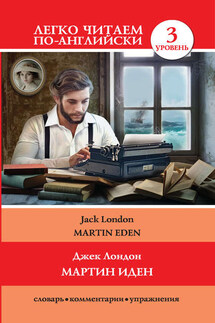Мартин Иден / Martin Eden - страница 9
“You must get a good education,” was the answer, “You must go to high school.”
“Yes – ” he began; but she interrupted:
“Of course, you can go on with your writing, too.”
“I will,” he said grimly.
“Why?” She looked at him, prettily puzzled.
“Because I must live and buy books and clothes, you know.”
“I forgot that,” she laughed. “Why weren’t you born with an income?”
“I’d rather have good health and imagination,” he answered.
Then she played and sang to him, while he gazed with hungry yearning at her.
Chapter 10
He stopped to dinner that evening, and, much to Ruth’s satisfaction, made a favorable impression on her father. They talked about the sea as a career, and Mr. Morse remarked afterward that he seemed a very clear-headed[61] young man. Martin talked slowly, which enabled him to find the best thoughts that were in him. His shyness and modesty even commended him to Mrs. Morse.
“He is the first man that ever drew notice from Ruth,” she told her husband.
Mr. Morse looked at his wife curiously.
“You mean to use this young sailor to wake her up?” he questioned.
“I mean that she is not to die an old maid if I can help it,” was the answer. “If this young Eden can arouse her interest in mankind in general, it will be a good thing.”
“A very good thing,” he commented. “But suppose, – and we must suppose, sometimes, my dear, – suppose he arouses her interest too particularly in him?”
“Impossible,” Mrs. Morse laughed. “She is three years older than he, and, besides, it is impossible. Trust that to me.[62]”
Sunday Martin had intended to devote to studying for the high school examination. But some days after he learned that he had failed in everything save grammar.[63]
“Your grammar is excellent,” Professor Hilton[64] informed him, staring at him through heavy spectacles; “but you know nothing, positively nothing, in the other branches, and your United States history is abominable – there is no other word for it, abominable.”
“Yes, sir,” Martin said humbly.
“And I can advise you to go back to the grammar school for at least two years. Good day.”
“You see I was right,” said Ruth. “It is because you need the discipline of study. Professor Hilton is right, and if I were you, I’d go to night school.”
But if my days are taken up with work and my nights with school, when am I going to see you? – was Martin’s first thought. He said:
“It seems so babyish for me to go to night school. I can do the work quicker than they can teach me. It will be a loss of time – ” he thought of her – “and I can’t afford the time. I have no time to spare, in fact.”
She looked at him gently. “Physics and chemistry – you can’t do them without laboratory study; and you’ll find algebra and geometry almost hopeless with instruction. You need the skilled teachers, the specialists.”
Chapter 11
Martin went back to his pearl-diving article.[65] After that he wrote an article on the sea as a career, and another on turtle-catching.[66] Then he tried, as an experiment, a short story, and he had finished six short stories and sent them to various magazines. He wrote, intensely, from morning till night, and late at night, except when he went to the reading-room, draw books from the library, or saw Ruth. He was profoundly happy. The joy of creation was his. All the life about him – the odors of stale vegetables and soapsuds, his sad sister, and the jeering face of Mr. Higginbotham – was a dream. The real world was in his mind, and the stories he wrote were reality.











